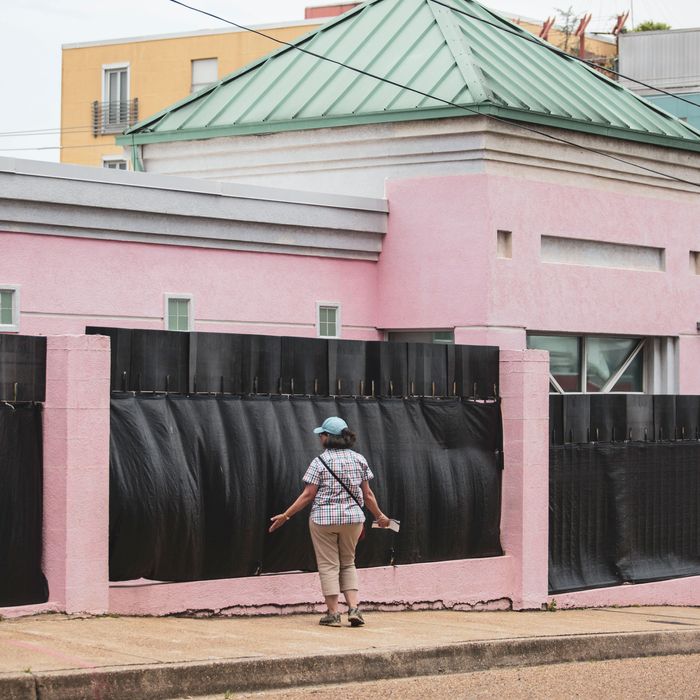
At 7:40 a.m. on a Saturday morning earlier this year, Neesha Davé answered a knock at her door. A process server handed her a stack of papers.
The documents called her “the leader of an organization that helps women in Texas abort their unborn children.” Davé is the deputy director of Lilith Fund, an abortion fund in Texas. It stood accused of having “knowingly and intentionally aided or abetted at least one post-heartbeat abortion in violation of the Texas Heartbeat Act,” or SB8, which allows anyone to sue anyone else who facilitates an abortion after around six weeks of pregnancy and which the Supreme Court allowed to go into effect last fall. A local woman named Sadie Weldon was demanding she sit for a deposition and provide the names of anyone else involved in those abortions, as well as “sources of financial support.” Said Davé, “They want to go on a fishing expedition.”
She had never heard of Weldon, but one attorney listed at the end was all too familiar: Jonathan Mitchell, SB8’s author and the former state solicitor general. Later, when the America First Legal Foundation, also listed as counsel on the demand, issued a press release with Davé’s name on it, she realized it was headed by none other than former high-level Trump official Stephen Miller. A third organization involved, the Chicago-based Thomas More Society, began tweeting that donors to abortion funds could face criminal prosecution, even though SB8 has only a civil remedy.
Kamyon Conner, the executive director of the Texas Equal Access Fund, or TEA Fund, who was also sent a deposition demand, told me that until their attorneys protested, a version of the documents that included her and Davé’s home addresses could be seen on the website of one of the legal groups behind the suit. “They’re letting you know, Our sights are set on you,” Conner said. Davé agreed. Her attorney had offered to receive service of legal papers. “There’s no reason to hire a process server to serve me at my home unless your goal is to use fear and harassment.”
Since the leaking of a draft Supreme Court decision overturning Roe, everyone from celebrities to reproductive-justice advocates has urged supporters to donate to abortion funds. These grassroots, often volunteer-led collectives help abortion seekers pay for everything from the procedure itself to child care and gas; they can be found all over the country but are a lifeline in states where the anti-abortion vise is tightening.
All of this makes Davé and Conner’s experience a warning sign for the post-Roe near future, one in which abortion-fund workers and volunteers, the patients they help, and even their donors could become targets. “It should be a terrifying reality check for people in the rest of the country as to what could happen next,” said Jennifer Ecklund, an attorney for both funds. “If they got the donor list, there would be nothing to stop them from suing every single person on it,” even if that’s outside the current bounds of the law. It could be enough just to chill the funds’ operations when they’re about to be needed more than ever. “If they starve them of resources, then it prevents people from getting abortions outside of Texas,” Ecklund said.
Abortion funds, founded to fill the gaps in actual access left by Roe and its descendants, have come a long way since Conner, now 39, huddled over an answering machine not long after the fund’s 2005 founding. “We had to be really careful not to hit DELETE,” she said. “I remember us giving out a max of 100 or 125 bucks. Now, the maximum that we give people is $1,000.” Once, they worked mainly in Texas; now, the majority of patients are traveling out of state.
Today, many abortion clinics and doctors are used to getting sued or to challenging laws in court, but abortion funds are relatively new arrivals to the high-stakes world of abortion litigation. In 2020, anti-abortion activists started passing local ordinances that were a precursor to SB8 and classified abortion as murder; some explicitly called out abortion funds as criminal organizations. “We filed defamation cases against the people making those claims,” said Ecklund. (The cases are on appeal to the Texas Supreme Court.)
An influx of donations and limited support from foundations have helped some funds grow from all-volunteer operations to slim professional staffs. Their resources still pale compared with those of the best-known national groups. According to a report last year, of nearly $912 million in foundation funding for reproductive rights between 2015 and 2019, only 3 percent went to abortion funds. The National Network of Abortion Funds says that in fiscal year 2019, its network of over 90 abortion funds helped more than 56,000 people, but that was only a quarter of the calls it got that year — and before the all-but-sure collapse of legal abortion in half the country.
A post-Roe world will demand that abortion-rights supporters, even ones in blue states, consider how far they’re willing to go into uncharted legal territory. That’s a question Texas abortion funds have already had to confront. “We understand that even as we take great pains to comply with SB8, we may still be targeted,” said Davé. “We have lost some people,” Conner said. “Not because they don’t support our work or the work of abortion funds, but they don’t want to be targeted for lawsuits. It doesn’t feel good. I don’t want to get emotional, but I don’t think people understand. There’s no way to quantify the stress that someone could sue you.”
The TEA Fund and Lilith Fund decided to press on. They refused to comply with the demand for depositions and documents, and they have countersued in multiple courts, including federal claims against America First and the Thomas More Society. Rather than resting their case on a fragile right to abortion, these suits argue that “banning the use of such funds based on their intended purpose also violates the organization’s free-speech rights.”
Such steadfastness has provided conservative legal activists with fodder for their campaign to take the funds down. In October, a federal district-court judge enjoined SB8, temporarily allowing abortions after six weeks until the conservative-controlled higher courts reversed him. “We had heard from our Texas abortion providers that they were ready to provide care if the law was enjoined,” said Davé, so they decided to help. Later, both the Lilith Fund and the TEA Fund submitted affidavits in a separate SB8 case saying that while the procedure had been legal in Texas, they had “paid for at least one abortion” that violated SB8. Although what they were doing was indeed legal during that injunction window, that declaration showed up in the deposition demands anyway.
Even if Mitchell and his ilk won’t stop the work of abortion funds, they have already succeeded in terrifying many patients, something that will only intensify if the Supreme Court allows Texas to ban all abortions in the state. In the days after SB8 passed, Davé said, there was a significant drop in call volume. “We know it’s not because fewer Texans need access to abortion care. If anything, they need far more assistance,” she said. “Laws like SB8 gain compliance from fear and confusion.” She takes it as a twisted compliment. “If people like Stephen Miller and Jonathan Mitchell think I’m somehow an impediment to their agenda,” Davé said, “that deeply affirms to me that I’m doing the right work.”
More on life after roe
- ERA Ratification Is Now Up to Trump’s Supreme Court
- The Unlikely Reason RFK Jr. Could Be Rejected by the Senate
- Project 2025’s Mastermind Is Obsessed With Contraception































